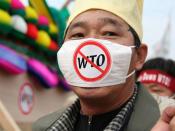China is now the world's fourth largest economy and the largest country in terms of population size. It has made rapid progress by reforming its economy, which has resulted in sustained increases in income and reductions in poverty. China has a socialist economy ruled by a Communist government which was installed after revolutionary success of Mao Tse Tung's forces in the civil war of 1949. After Mao's death in 1978, his successor, Deng Xiao Peng, implemented a range of radical reforms designed to improve China's economic performance. Since liberalisation began in 1978, China's GDP has achieved between 7% and 10% in the last decade. A recent research (Wikipedia, 2007) shows China's 2006 GDP per capita reached US $2,034 which was approximately 10.5% of GDP growth rate. It was the first time that China's GDP per capita exceeded US $2,000, compared to the GDP per capita in 2005 was US $1703, rose nearly 20%.
On December 11, 2001, China finally completed fifteen years of negotiations and became the 143rd member of the World Trade Organisation (WTO). The WTO is a powerful international organisation which enforces agreements on reducing trade protection. It is also the most important multilateral trade treaty governing the rules of world trade. Its objectives include settling trade disputes, reviewing national trade policies, assisting developing countries in trade policy issues through technical assistance and training programs and cooperating with other international organisations.
China joined the World Trade Organisation (WTO), indicating China moves towards the world globalisation by offering maximum amounts of trades and investments to foreign countries. The opening of Chinese economy to worldwide certainly increases trade flows between China and other foreign countries as well as more diversified investments from multinational enterprises (MNEs). MNEs are firms that own business operations in more than one country such as Nokia,


